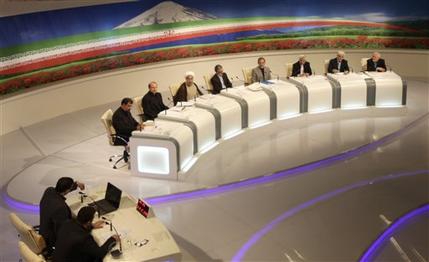 TEHRAN, Iran (AP) -- The eight candidates running in Iran's June 14 election for president took radically different stands on personal freedoms, women's rights and censorship in the country's second round of televised debates Wednesday. Moderates vowed to loosen restrictions and hard-liners backed strong state intervention in people' lives.
TEHRAN, Iran (AP) -- The eight candidates running in Iran's June 14 election for president took radically different stands on personal freedoms, women's rights and censorship in the country's second round of televised debates Wednesday. Moderates vowed to loosen restrictions and hard-liners backed strong state intervention in people' lives.The four-hour debate focused on cultural issues. A previous round covered the economy, and an upcoming debate will be devoted to foreign policy and security.
The election is to pick a successor to President Mahmoud Ahmadinejad, who cannot run for a third term. His re-election in 2009 was hotly disputed and set off weeks of street riots. Since then, heavy government repression has driven reformers off the streets, and last month, leading reform-minded candidates for president were disqualified.
Iran's president does not have control of central issues like nuclear development policy, but a president who has a close relationship with Supreme Leader Ayatollah Ali Khamenei can wield influence.
During the debate, centrist Hasan Rowhani said he would form a women's affairs ministry if elected, but Saeed Jalili, Iran's top nuclear negotiator, said the best job for a woman is to be a mother.
Pro-reform candidate Mohammad Reza Aref insisted that Iranians have social and cultural rights under the constitution, complaining that the government looks at rights as a privilege it can deny, while imposing censorship at will.
"The solution to the country's cultural problems is to minimize the government's interference and allow guild associations and experts to run their own affairs," said Rowhani, Iran's former top nuclear negotiator. "Women work but don't enjoy equal rights. I'll allocate special insurance for women and will form a women affairs ministry to return their trampled rights to them."
Had-liner Jalili disagreed.
"The main role for a woman is to be a mother. If we look at mother as a fulltime role to raise children properly, many social ills would be erased," he said.
Aref, a former vice president when reformist leader Mohammad Khatami was president, said steps like banning satellite dishes, imposing media censorship, questioning university teachers and creating a tense security atmosphere in universities in recent years under Ahmadinejad have only caused disappointment and a sense of insecurity for Iran's 76 million people.
"An unprecedented security atmosphere has been imposed in recent years that caused lack of motivation among students," he said. "The solution is not confrontation, elimination or shutting down. We are living in the age of communications. The solution is producing fine cultural works."
Gholam Ali Haddad Adel, a lawmaker, said the country's leaders must intervene to protect the country's Islamic identity and culture.
"To fight drug addiction, we prevent drug smuggling and promote security. It's the same for cultural issues. If a cultural work such as a book or film insults people's religious beliefs and sanctities or attacks the moral pillars of the society, will you allow it to enter families and create corruption? Won't you censor it?" he asked.
Two other Khamenei loyalists, Mohammad Bagher Qalibaf and Ali Akbar Velayati, sent mixed signals in an attempt to broadcast flexibility.
Qalibaf, Tehran's mayor, is a former Republican Guard commander and considered an insider, but he adopted the language of reformists.
Both said the next government must move toward reducing its intervention in people's private lives and allow experts to run cultural affairs. Yet they stuck to hard-line values.
Iran's clerics have shut down more than 150 newspapers, jailed dozens of writers and banned many news websites in the past decade over vague charges of insulting authorities or Islamic tenets.
Satellite dishes are banned, but Rowhani said about half of Iran's people tune in to foreign television channels. Television channels are under state control, and no private channels are allowed to operate in Iran. Authorities jam access to foreign satellite channels.
Although Wednesday's debate was restricted to cultural issues, some candidates still mentioned inflation and unemployment, which stand at the center of the presidential campaigning.
Mohsen Rezaei, a former commander of the elite Revolutionary Guard, said cultural progress won't be achieved until economic woes are solved.
To make his point, he held up a 10,000-rial bill.
"Today, it's equal to 3,000 rials this time last year. Poverty, unemployment and inflation are serious problems. Cultural programs are ineffective until economic problems are tackled," he said.
Iran is suffering from 30 percent inflation and 14 percent unemployment. Western oil and banking sanctions over Iran's refusal to stop uranium enrichment have deeply cut its revenues. The U.S. and its allies fear that Iran may be aiming to develop a nuclear weapon, a charge Tehran denies.
By The Associated Press
The Iran Project is not responsible for the content of quoted articles.











